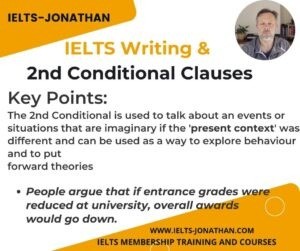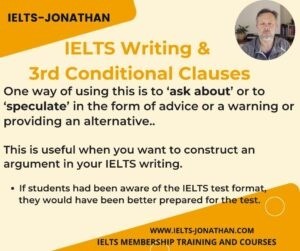How conditional sentences are important in IELTS
Understanding and using conditional sentences will make your language more ‘complex’ and will allow you to talk and write about more complicated ideas.
As you understand the possible meanings and functions of conditional sentences, it will also help your understanding in the IELTS reading and listening test.
In this lesson, we will go through the basic meaning and grammatical construction of 2nd Conditionals with examples and a chance to practice what you know.
The good news is that although learning the concept of English conditionals might not always be easy, once you have mastered it, it is not easily forgotten. 🙂
Conditionals – The Basics
Conditional sentences are always made up of two parts or two clauses; these are just different names for the same thing.
There is always a condition and a result.
If water reaches a temperature of 100 ℃ or 221 ℉, it boils and then forms a gas.
Here’s an example:
If + clause (condition) + clause (result)
or
Clause (result) + if + clause (condition)
The basic use of the 2nd conditional
The 2nd conditional is used to talk about an events or situations that are imaginary if the present context was different.
For this reason, the 2nd conditional is also known as an ‘unreal’ condition.
In academic English, the 2nd conditional can be used as a way to explore understanding behaviour and to put forward theories, and this can be the same for an IELTS essay.
If governments’ introduced high rates of tax, it would force the rich to live in tax havens.
If poachers were not severely punished, many large animals would become extinct in a short amount of time.
People argue that if entrance grades were reduced at university, overall awards would go down.
The 2nd conditional can be thought of as a situtaion which is:
Different to now.
If he met the King of England, he would say hello. – He probably won’t meet the King.
To describe impossibility
If I had his mobile number, I would WhatsApp him. – I don’t have his number now, so it’s impossible for me to do that.
or to recommend or give adivce
If I were you, I wouldn’t stay out too late because you need to be up early in the morning.
How the 2nd conditional is formed
A 1st conditional sentence is formed in this way:
If + Condition + Result
Another way of putting this is:
If + past simple + Would + infinitive
If I met the King of England, I would say hello.
You can also change the order of the sentence:
Result + If + Condition
Another way of putting this is:
Will + present simple + If + present simple
For instance these sentences are reversed but they retain the same meaning.
I would buy a house if I won the lottery
→ If I won the lottery, I would buy a house.
As you can see from the first example, there is no comma in this construction.
I would buy a house if I won the lottery
So, the second conditional can be thought of as ‘unreal‘ conditionals or in other words ‘results’ or ‘situations’ that we can imagine if there was a different condition.
If you reviewed the IELTS test format, you would be better prepared for the test.
One way of using them is to ‘ask about’ or to ‘make a prediction’ in the form of advice or a warning.
This is useful when you want to construct an argument in your IELTS writing.
If students are made aware of the IELTS test format, they would be better prepared for the test.
If you submitted the test after the teacher’s deadline, it would not be marked.
If you asked for writing feedback, you would see the errors that you make.
Small businesses would lose out if they didn’t adapt to new social media developments.
If you checked the question format, you would see that you can only use three words in the gap.
This is not the only function, as you often can read 1st conditionals in the form of ‘recomendations’ or as ‘advice’
If you asked for feedback on your writing, you would see the errors that you make.
How is the second conditional different from the first conditional?
The second conditional is often a lot ‘more unlikely’. This can due be to the speaker’s attitude to something as well as just facts.
Examples: Mareck thinks these things are possible, Jana doesn’t.
Mareck: If I won the lottery, I would buy a big house.
2nd conditional: (I’m probably not going to win the lottery, it’s just a dream, not very real).
Jana: If I win the lottery, I will buy a big house.
1st conditional: (I think I might win. Why not? Someone has to win.)
Further ways of constructing the 2nd Conditional
The use of ‘would’ is not the only verb we can use in the 2nd conditional.
We can also use some modal verbs which can change the message function or suggestion.
For instance:
If Bangkok persuaded residents to move away from the city, modern train and underground infrastructure could be initiated.
Remember that the ‘modal verb’ replaces ‘would’ in the result clause.
Possibility
We can express a possibility with ‘uncertainty’ or with ‘caution’ by using may, might or could.
If more fines were issued, it might deter people from littering.
If interest rates increased, it may lead to deflation.
We could see a reduction in traffic accidents if cameras were installed.
Modal Verb – Could
If people were trained in IT, it could improve basic literacy.
If fossil fuels were banned within ten years, the economy could survive.
Modal Verb – Should
If we reduced our carbon use considerably, we should be able to reduce the effects of climate change.
If women were given more rights, we should see less violent crime in society.
Phrases – Likely to/ Unlikely to
We are likely to see decreased traffic congestion if cities legislated against inner-city traffic.
More uses for ‘If we/ I/ you were to…..’
In this construction, remember that situation is considered even more hypothetical as in these examples:
If we were to ban plastic in food products, how would we preserve vegetables and fruit for export.
If it were not for the continued low interest rates, we would not see inflated house prices.
Conclusion
Remember that the verb you use can subtly change the meaning of the sentence but the overall message is about a ‘imaginary’ on the basis of a ‘different situation.
Try the following exercises to test yourself, but think carefully about what the sentence is expressing.
IELTS Writing activity with Conditional Sentences
| Match the best option to form 2nd conditional sentences. |
|
|
If you need to study conditionals further, the British Council have lots of activities on using English conditionals and you can test yourself here.
Next Lesson: Third Conditionals and IELTS 🙂
Answers
- If he ate nuts, would he get an allergy?
- If she asked for help, would they assist her?
- If Peter watched the film, would he enjoy it?
- The man would become angry if you shouted at him.
- You would cry if you lost your cat too.
Aspects adapted from Perfect English Grammar
I’m Jonathan, an online-IELTS preparation specialist.
I help IELTS students achieve the IELTS score they need with courses, training, feedback and advice.
I have taught IELTS and University English in more than a dozen universities and schools around the world.
I’m a parent, traveller and passionate about language teaching and helping students achieve their dreams.
Whilst living in Austria or working in Asia, I run IELTS courses to help students get to where they want to be.
If you are serious about IELTS, connect with me to see how I can help you.





Was this helpful? Leave a comment :)